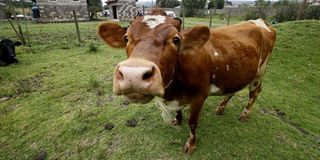Brief news on farming and agribusiness in the country

A dairy cow grazes in a farm in Nakuru. Protection of animals in disasters is a key focus of a new online course for animal health practitioners, veterinary officers, paraveterinary workers and livestock farmers organised by World Animal Protection (WAP). PHOTO | FILE | NATION MEDIA GROUP
What you need to know:
- Dr Judy Kimaru, WAP’s disaster manager for Africa, said the course seeks to enable risk management and reduction, including understanding the factors that lead to emergencies and being prepared for them, to minimise animal losses.
- The course is divided into three core topics: disaster risk reduction (DRR) and management, climate change adaptation and basic care of animals during emergencies.
- Under the AgriProFocus Kenya Network umbrella, they said the country should join international bodies like the Codex Alimentarius that sets food standards that contribute to food safety.
- The steering committee of the umbrella body, which was launched on February 26, 2020, is also actively developing a three-year strategy for years 2020-2023.
Livestock farmers to benefit from online course
World Animal Protection (WAP), an animal welfare organisation, has launched a free online course for livestock farmers, animal health practitioners, veterinary officers, and paraveterinary workers.
They will be taught how to protect their livestock during disasters.
The programme dubbed PrepVet, which is a universal standardised training course, is ideal for equipping animal health practitioners, veterinary officers, paraveterinary workers and livestock farmers with skills on handling fast onset disasters including storms, floods, earthquakes and volcanic eruptions.
Dr Judy Kimaru, WAP’s disaster manager for Africa, said the course seeks to enable risk management and reduction, including understanding the factors that lead to emergencies and being prepared for them, to minimise animal losses.
“Many people living in risk-prone areas rely on animals for their livelihoods and survival. Therefore, protection of animals in disasters is a key focus of the strategies in this course... Although many hazards are inevitable, the vulnerability of communities can be reduced,” said Dr Kimaru.
The course is divided into three core topics: disaster risk reduction (DRR) and management, climate change adaptation and basic care of animals during emergencies.
—Brian Okinda
****
Ensure food supply in time of virus, State told
Stakeholders in the country’s food chain have petitioned the government to ensure policies are formulated and relevant laws are enforced to enable safe food production during the Covid-19 pandemic.
The groups – which include Advisors of Kenya, HIVOS, Solidaridad, Africa Agribusiness Academy, RTI International, private and public businesses – also want the implementation of standards and codes of practice and regulations related to food along the entire food value chain.
Under the AgriProFocus Kenya Network umbrella, they said the country should join international bodies like the Codex Alimentarius that sets food standards that contribute to food safety.
They also want the State to ensure traceability of produce. “While some retailers may have direct contracts with large farms for produce in which they trade in large volumes, they typically rely on intermediaries such as aggregators and marketing agents to fill gaps when demand spikes, and for lower-volume produce,” said AgriProFocus Kenya Network facilitor Samuel Kariuki.
He said food systems have been severely impacted by Covid-19. “It has affected supply chains, from production to last-mile distribution.”
—Dennis Lubanga and Leopold Obi
****
Agriculture lobby unveils new board and trustees
Agriculture Sector Network (ASNET), the multi-agency organisation seeking to coordinate and organise the country’s agriculture industry transformation agenda, has developed a six-month Rapid Results Initiative (RRI).
The steering committee of the umbrella body, which was launched on February 26, 2020, is also actively developing a three-year strategy for years 2020-2023.
The development was announced during the network’s induction of the new board, council, advisors and trustees and the Kenya Private Sector Alliance’s (Kepsa) Agriculture Sector Board, which was done virtually on Wednesday.
Elgon Kenya Ltd Managing Director Dr Bimal Kantaria is the new chairman, former Kenya Flower Council CEO Jane Ngige was named the vice-chairperson while the Kepsa Foundation chairman Lee Karuri is the new chair of trustees. The team will serve for three years.
The RRI is expected to put in place a Covid-19 economic management framework, ease movement of inputs and farm produce to markets, expedite suspension of Pre-Export Verification of Conformity on farm inputs, facilitate VAT refunds for businesses, survey the impact of Covid-19 on businesses, implement the Flowers of Hope project, ensure increased cargo freights for fresh produce and maize importation to boost food security.
—Brian Okinda





